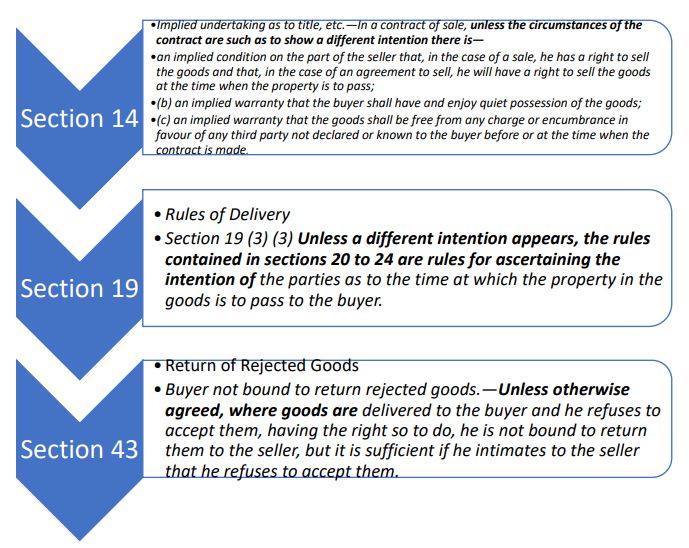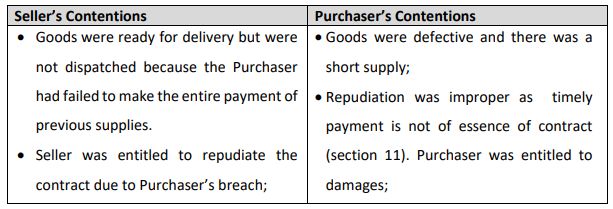Your Intention Matters: A perspective through Sale of Goods Act, 19301
A business contract is a culmination of many perspectives i.e. commercial + technical + operational + expressed / unexpressed expectations of all stakeholders. Many times, the requirements are expressed but not recorded appropriately and these unexpressed expectations create disputes. To ensure that agreements executed by the parties do not result in disputes but successful business transactions, recording the intentions and expectations of the parties explicitly is very important.
Contracting parties should go through a detailed churning process to explicitly indicate their intentions. It is worth noting that in the most commercial aspects, law gives utmost importance to the intention of the parties and a well recorded document which reflects intentions of the parties through proper recitals and clauses has a great evidentiary value in cases of disputes.
To further understand importance given to the intention of the parties, one needs to look at the provisions of Sale of Goods Act, 1930 (hereinafter referred to as "Act"). There are more than fifteen sections which subject the provision of the Act to the different intention recorded in the contract. The magical words used in most of these sections are:
Unless a different intention appears OR
Unless otherwise agreed OR
Unless the circumstances of the contract show different intention
Aspects like implied warranties, rules of delivery, return of rejected products, stipulations about time of payment and many more such aspects2 have been specifically made subject to the intention of the parties.
Section 14 of the Act provides that unless and until there is a specific disclaimer laid down by the seller in the agreement, it would be assumed that the products intended to be sold do belong to him, are merchantable and there are no third-party rights on such goods.
Section 41 of the Act provides that every buyer has a right of examining goods on delivery at the time of delivery, unless the parties have agreed otherwise, and the right of examination is waived off.
Illustrations of sections subject to parties' intention are listed below:

Along with recording the intention appropriately, contracting parties should also act in accordance with the contract and demonstrate the intention. Conduct of the contracting parties that is inconsistent with the provisions of the contract may also be a hindrance to enforcement of the contract.
To understand importance attached by the Courts to the intention of the parties recorded in the contract and the consistent conduct of contracting parties, we shall look at two interesting judgements passed in the context of section 11 of the Act i.e., stipulations as to time of payment.
These days, delayed payment has emerged as a major issue for many sellers3. To check this problem, government of India has launched MSME Samadhaan Portal, which is a Portal created by Office of DC(MSME), Ministry of Micro, Small and Medium Enterprises (MSME) where Micro and Small Enterprises (MSEs) can file their applications online regarding delayed payments.4
While this is one remedy available, through this article, we shall generally analyse the relevant clauses that may be incorporated in a contract to address issues related to delayed payment. Stipulation as to time of payment is addressed in section 32 and section 11 of the Sale of Goods Act and both the provisions refer to specific intention of the contracting parties.
Section 32 provides that: Payment and delivery are concurrent conditions—Unless otherwise agreed, delivery of the goods and payment of the price are concurrent conditions, that is to say, the seller shall be ready and willing to give possession of the goods to the buyer in exchange for the price, and the buyer shall be ready and willing to pay the price in exchange for possession of the goods.
Parties generally provide for detailed delivery schedules and payment schedules upon delivery. Thus, whether timely payment by the buyer is of essence is determined through Section 11 which provides that:
Stipulations as to time—Unless a different intention appears from the terms of the contract, stipulations as to time of payment are not deemed to be of the essence of a contract of sale. Whether any other stipulation as to time is of the essence of the contract or not depends on the terms of the contract.
This implies that generally timely payment is not of the essence of a contract and thus delayed payments by the customers may not be a ground for repudiation of the contract by the seller, unless the contract records a clear stipulation to that effect or records specific rights of seller like suspension, interest etc for delayed payment.
To understand this provision better, it would be useful to refer to the following cases decided by the Delhi High Court:
a) Maa Harsiddhi Infra Developers Private Limited V. Mahavir Transmission Limited5 on 5th May 2022 decided in favour of the Seller i.e., repudiation of agreement due to delayed payment was held valid;
b) M/S. Kei Industries Ltd. vs Delhi Vidyut Board & Ors6 decided in favour of the buyer.
Though facts were similar and typical of a sale-purchase agreement, the construct of the agreement and the conduct of the Parties made all the difference.
Facts of Maa Hardeshwari:
Seller was awarded a turnkey contract by Tripura State Electricity Corporation Ltd to create additional power infrastructure. Purchaser issued four purchase orders for delivery of conductors in four lots. Seller initially supplied few conductors and raised 22 invoices. Upon further supply, additional invoices were raised. Purchaser defaulted in payment and thus seller withheld the balance supply leading to disputes.

The crux of the dispute, as noted in the impugned award, is the question - "Was the seller justified in withholding supplies? Whether seller was entitled to repudiate the contract due to delayed payment?
Upon looking at the contract, the Court stated that the seller was justified in not dispatching on the ground that payments due for the first tranche of the cables delivered had not been made.
The Court referred to the opening words of the provision "unless a different intention appears from the terms of the contract" and stated that stipulations as to the time of payment are not deemed to be essence of the contract, unless a different intention is borne out from the terms of the contract. After analyzing the contract and consistent conduct of the Parties, the Arbitrator had rightly held that the Purchaser was in breach of the payment obligations for the quantity supplied as Clause 3 of the contract that specifically required the Purchaser to make payment for the material supplied within 60 days from the date of Goods Receipt Note (GRN) and in case of delay interest would be payable@ 12% per annum. This term was vital for the reciprocal performance obligations of the contract. Since this condition was breached by the Purchaser, the seller, being the innocent party, was entitled to repudiate the contract. Here, the Purchaser had clearly received the goods and was not making payment. The seller therefore was entitled to withhold supplies and timely payment was of essence.
Facts of M/S. Kei Industries Ltd. vs Delhi Vidyut Board & Ors
On 20.11.1992, the Purchaser awarded a contract for supply of 750 K.M of Control Cables. However, the contract could not be completed due to disputes amongst the Parties.


Parties invoked arbitration and though the arbitration award was passed in favour of Seller, the Court set aside the award and held that the requirement of opening of the LC had been given a go by both the parties and there were no clauses to support the importance on opening of Letter of credit in the agreement.
Both the cases illustrate a specifically drafted contract which gives importance to timely payment coupled with consistent conduct of the parties will help the Sellers in justifying repudiation in case of delayed payments. When disputes arise, the parties are required to justify their conduct within the boundaries of the executed contract. Conduct of the parties is again not signatory's conduct but the conduct of all the parties who are performing the agreement which may include various employees and personnel from different departments.
Thus, parties should exercise caution and record the expectations and intentions of all stakeholders while entering into formal business agreements. This exercise will help to ensure consistent conduct by the stakeholders and reduce possibilities of breaches.
Footnotes
1 The article reflects the general work of the author and the views expressed are personal. No reader should act on any statement contained herein without seeking detailed professional advice.
2 Section 26- Risk prima facie passes with property; Section 32: Payment and delivery are concurrent conditions; Section 35: Buyer to apply for delivery; Section 37: Delivery of Wrong quantity; Section 39: Delivery to Carrier or Wharfinger; Section 40: Risks where goods are delivered at a distance place, Section 41: Buyer's right of examining goods.
3 Delayed payment hassles in India - MSMEs: About Rs 10.7-lakh-crore stuck in delayed payments to MSMEs, amounting to 6% of India's GVA - The Economic Times (indiatimes.com)
4 FAQ (msme.gov.in)
5 O.M.P. (COMM) 187/2022 & I.A. 5973/2022
6 2001 (1) ARBLR 140 Delhi
The content of this article is intended to provide a general guide to the subject matter. Specialist advice should be sought about your specific circumstances.
